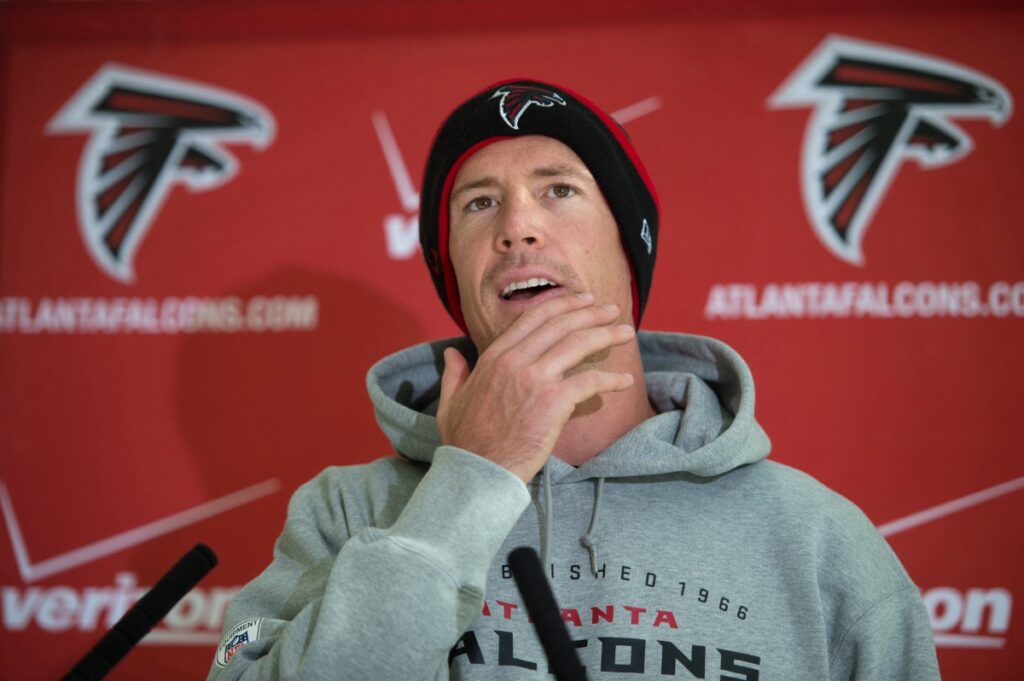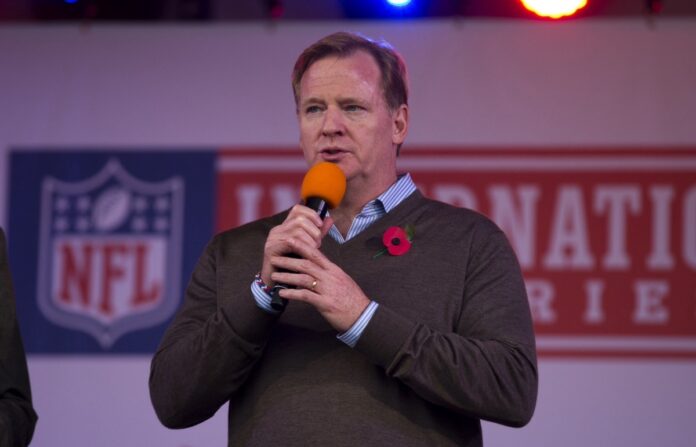The Atlanta Falcons are scheduled to face off against the Detroit Lions in an NFL football match at London’s Wembley Stadium this Sunday.
Yesterday, British Chancellor George Osborne stated, “I’ve said to the NFL that anything the government can do to make this happen, we will.”
He said, “There are 32 teams in America, and one of them could be a London team. That’s a serious prospect. It’s not going to happen overnight but over the next few years.”
Impressive commitment, Georgie!
Rocky Boiman had a distinguished career as an NFL linebacker.
Since then, he has transitioned into NFL broadcasting in London.
In the past three years, he has provided commentary for all three Super Bowls on BBC Radio, and he also called the Jaguars vs 49ers game at Wembley Stadium in 2013.
In addition to game broadcasts, Rocky has contributed to over a dozen NFL-themed studio shows in London.
So, what are Rocky’s thoughts on the potential for an NFL team based in London?
A London-based NFL franchise is anticipated to emerge within the next eight years.
It’s now considered a near-certain outcome. The NFL is set to try it, but the big question remains: will it prove successful?
In my view, it’s doubtful. The considerable distance between America and London, with a 6-9 hour plane journey required every other week, is the primary obstacle frequently cited for the potential failure of this endeavor.
However, based on my experience, numerous other factors contributed to the inevitable downfall of the NFL in London.
While we won’t delve into an exhaustive list here, I’ll present five reasons to kickstart the discussion on why London is destined to be an unsustainable long-term option for the NFL:

REASON #1
Lack of Youth & High School Football Foundation
In my view, the reason football enjoys such immense popularity in America is because it has become deeply ingrained in our culture and woven into the very fabric of our nation.
Fans not only have an affinity for the professional game, but they also relish it at all levels.
Attend a youth football game on a Saturday morning, and you’ll find a field teeming with spectators.
Visit a high school football game on a Friday night, and you might witness over 10,000 people in the stands.
In America, football is as much, if not more, about community as it is about attending an NFL stadium to watch your favorite star.
This level of engagement is absent in London. While they do have some nascent youth leagues, they are still in their infancy, to say the least.
On a related note, I believe Americans derive satisfaction from tracking the journey of a standout player from high school to college and eventually to the professional level.
Personally, having attended the same high school as Luke Kuechly, I found myself becoming a fan of Boston College as his career advanced and, ultimately, the Carolina Panthers because I wanted to see him succeed.
This personal connection to players would be absent in the UK, as there is no established youth system to cultivate interest in the game and provide a foundation for its growth.
None of these NFL players would feel “belonging” to the local community.
I firmly believe you can’t simply introduce a roster of star players to a city and expect sustained interest.
While they may be captivated initially, once the novelty wears off—and mainly if the team isn’t performing well—fans will disengage because there is no underlying, widespread love for the sport of football.
REASON #2
Funky British regional issues
This is something I would have never been aware of if I hadn’t delved deep into discussions with my British producer and play-by-play partner.
They explained that British culture is quite particular about who and what they pledge loyalty to and who a team “belongs” to.
Therefore, the location and name of the franchise could potentially lead to significant disagreements, issues, and even a lack of interest.
For instance, let’s say we name this new British NFL team the Knights.
According to my colleagues, if you were to label the team the London Knights, due to cultural nuances, potential fans living in surrounding cities like Yorkshire, Birmingham, Nottingham, etc., might think, “Oh, that’s the London team; it’s not ours,” and consequently lose interest, if not become a bit put off.
However, if you named them the England Knights, you run the risk of the London fan base, which would be the main economic driver for the franchise, losing interest and not feeling a strong sense of ownership over the team.
It’s a peculiar dynamic that one would only grasp if they were familiar with the cultural quirks of the British.
Entering into this environment, there’s a likelihood of overestimating the actual market size for an NFL franchise.
REASON #3
Keeping interest alive for the long haul
This point extends the first one, emphasizing the importance of keeping a fan base engaged through the inevitable ups and downs a team will face over the years.
While it may seem like the sellouts of the Wembley NFL games in recent years indicate a ready audience in the country, I’ve personally witnessed the NFL go to great lengths to turn these games into star-studded events.
It all begins with bringing over a dozen or more former NFL legends, such as Joe Montana, Franco Harris, Kenny Stabler, etc., who make weekly appearances to ignite fan excitement.
Additionally, there’s a grand pep rally in Trafalgar Square featuring both playing teams, cheerleaders, the band, Roger Goodell, and the whole shebang.
I’m curious to see how fan interest will hold up when there are no NFL legends present and no pep rally in the square.
Will people still care, then? And what about in year three, when the team may be struggling at 2-10, and a team like the Tennessee Titans (a place that I would venture to say many in London couldn’t even locate on a map) comes to play on a cold, rainy December afternoon?
Can we expect people to remain interested? Even in Jacksonville, with its less-than-stellar record, they struggle to fill the seats, which is in one of the most beautiful states in the country!
REASON #4
Five-hour time difference
A game scheduled for 1 pm EST aligns well with 6 pm local time in London, which is manageable.
However, any other time would present a significant challenge, particularly a primetime game at 8:30 EST, which would occur at 1:30 in the morning in Great Britain.
I doubt many fans would stay up that late to watch the London Knights play a primetime game in America.
Given that every team has a primetime game on Thursday, and most have at least one game on Sunday night or Monday night, scheduling these games becomes a logistical challenge.
REASON #5
In-season free agency
Many argue that attracting off-season free agents would be a challenging task, but I have a different perspective.
Offering a substantial sum to a player in their twenties to relocate to one of the most vibrant cities on the planet for a season that lasts only about five months doesn’t seem daunting.
However, recruiting weekly free agents during the season presents a different set of challenges.
Every team engages in this practice to fill positions and provide depth, given the inevitable injuries over the year.
Yet, asking a player to endure a six-plus hour plane ride for a tryout on a Tuesday, with the possibility that they may not even be signed, is something no agent or player will likely agree to.
They must establish a “home away from home” facility in America.
This would entail constructing two state-of-the-art facilities—one in America and one in London—adding another significant cost to bringing football to Europe.
Each of these factors presents a potential hurdle to the success of a London franchise, and this is just a starting point.
The NFL benefits from numerous advantages in the United States that contribute to its status as the country’s most popular sport, enduring both prosperous and challenging times.
As these pressures mount for a prospective London franchise—and they undoubtedly will—a greater appreciation for the more minor details that contribute to the NFL’s supremacy in this country will come to light.
Will there be enough to counterbalance these challenges? I have my doubts…

